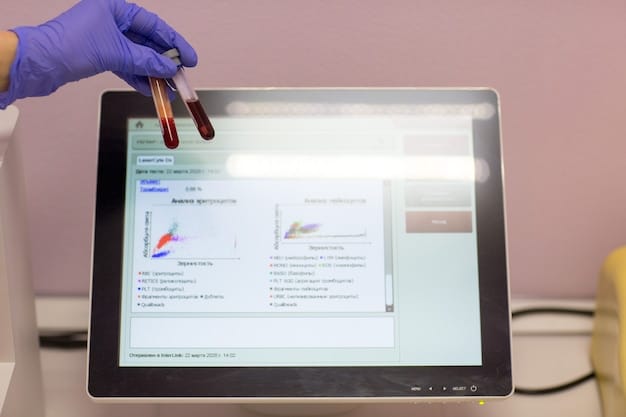Personalized Medicine: How AI is Transforming US Healthcare

The rise of personalized medicine in the US is being significantly shaped by artificial intelligence (AI), enabling healthcare providers to offer more tailored and effective treatments based on individual genetic, lifestyle, and environmental factors.
Imagine a future where your doctor prescribes treatments based on your unique genetic makeup. The rise of personalized medicine: A look at ai-driven healthcare in the us is making this vision a reality, transforming how we approach healthcare in the United States.
Understanding Personalized Medicine
Personalized medicine, also known as precision medicine, is revolutionizing healthcare by shifting away from a one-size-fits-all approach. This innovative field leverages an individual’s unique characteristics, such as their genetic makeup, lifestyle, and environment, to tailor treatments and prevention strategies. By understanding these specific factors, healthcare providers can deliver more effective and targeted care.
The core principle of personalized medicine involves analyzing vast amounts of patient data to identify patterns and predict individual responses to treatments. This data-driven approach enables doctors to make informed decisions, ensuring that each patient receives the most appropriate and beneficial interventions.

Key Components of Personalized Medicine
Personalized medicine encompasses several essential components that work together to deliver tailored healthcare solutions.
- Genetic Testing: Analyzing an individual’s DNA to identify genetic variations that may influence their susceptibility to diseases and their response to medications.
- Biomarker Analysis: Measuring specific molecules in the body, such as proteins or metabolites, to detect early signs of disease or predict treatment outcomes.
- Data Analytics: Utilizing advanced algorithms and machine learning to analyze large datasets of patient information, identifying patterns and insights that can inform clinical decision-making.
- Electronic Health Records (EHRs): Gathering and organizing patient data in digital format, providing a comprehensive view of an individual’s health history and facilitating personalized treatment planning.
These components collectively enable healthcare providers to make more accurate diagnoses, select the most effective treatments, and prevent diseases before they develop. By integrating these elements, personalized medicine aims to improve patient outcomes and enhance the overall quality of healthcare.
In summary, personalized medicine represents a paradigm shift in how healthcare is delivered, focusing on individual patient characteristics to optimize treatment strategies and improve health outcomes. The integration of genetic testing, biomarker analysis, data analytics, and EHRs plays a crucial role in making this approach a reality.
The Role of Artificial Intelligence in Personalized Medicine
Artificial intelligence (AI) is playing a pivotal role in accelerating the advancement of personalized medicine. AI technologies, including machine learning and natural language processing, are being used to analyze vast amounts of patient data and identify patterns that would be impossible for humans to detect manually. This capability is transforming various aspects of healthcare, from drug discovery to clinical decision-making.
AI algorithms can sift through complex genomic data, medical records, and research literature to uncover insights that inform personalized treatment plans. By leveraging AI, healthcare providers can make more accurate diagnoses, predict patient responses to medications, and develop targeted therapies tailored to individual needs.
AI-Powered Tools and Applications
AI is being integrated into a wide range of tools and applications that are shaping the future of personalized medicine.
- Diagnostic Tools: AI algorithms can analyze medical images, such as X-rays and MRIs, to detect diseases at an early stage, often with greater accuracy than human radiologists.
- Drug Discovery: AI is being used to identify potential drug candidates and predict their effectiveness, significantly accelerating the drug development process.
- Predictive Analytics: AI models can predict patient outcomes based on their individual characteristics, enabling healthcare providers to intervene proactively and prevent adverse events.
- Virtual Assistants: AI-powered virtual assistants can provide personalized health advice, monitor patient symptoms, and facilitate communication between patients and healthcare providers.
These applications are not only enhancing the efficiency of healthcare delivery but also improving patient outcomes by providing more personalized and targeted interventions. AI’s ability to process and analyze vast amounts of data is proving to be a game-changer in the field of personalized medicine.

In conclusion, AI is revolutionizing personalized medicine by enabling healthcare providers to analyze complex data, make more accurate diagnoses, and develop targeted therapies. The integration of AI-powered tools and applications is paving the way for a future where healthcare is truly personalized and tailored to individual needs.
AI in Drug Discovery and Development
The traditional drug discovery process is lengthy, expensive, and often yields limited results. However, AI is transforming this landscape by accelerating the identification of potential drug candidates and predicting their effectiveness. By analyzing vast amounts of chemical and biological data, AI algorithms can identify promising compounds and optimize their properties for therapeutic use.
AI-powered tools are being used to screen millions of compounds, predict their interactions with target molecules, and assess their potential for toxicity and adverse effects. This capability significantly reduces the time and cost associated with drug development, enabling researchers to bring new therapies to market more quickly.
Benefits of AI in Drug Discovery
The application of AI in drug discovery offers several significant benefits:
- Faster Screening: AI algorithms can rapidly screen massive datasets of chemical compounds to identify potential drug candidates.
- Improved Prediction: AI models can predict the effectiveness and safety of drug candidates with greater accuracy than traditional methods.
- Reduced Costs: AI can reduce the costs associated with drug development by accelerating the screening process and minimizing the need for expensive laboratory experiments.
- Targeted Therapies: AI can help identify personalized therapies by analyzing individual patient data and predicting their response to specific drugs.
By leveraging AI, pharmaceutical companies can accelerate the development of new drugs and bring more effective treatments to patients in need. This technology is poised to revolutionize the drug discovery process and improve outcomes for a wide range of diseases.
In summary, AI is transforming drug discovery and development by accelerating the identification of potential drug candidates, improving prediction accuracy, and reducing costs. The application of AI in this field is paving the way for the development of more targeted and effective therapies for a wide range of diseases.
Challenges and Ethical Considerations
While the rise of personalized medicine driven by AI holds tremendous promise, it also presents several challenges and ethical considerations. These include data privacy concerns, algorithmic bias, and the potential for unequal access to personalized treatments. Addressing these issues is crucial to ensure that personalized medicine benefits all members of society.
Protecting patient data is paramount in the age of AI-driven healthcare. The use of sensitive genetic information and medical records raises concerns about privacy breaches and the potential for misuse of data. Robust security measures and strict data governance policies are needed to safeguard patient privacy and maintain trust in the healthcare system.
Addressing Ethical Concerns
To ensure the responsible and ethical implementation of personalized medicine, several steps need to be taken:
- Data Privacy: Develop and enforce strict data privacy regulations to protect patient information from unauthorized access or misuse.
- Algorithmic Bias: Identify and mitigate biases in AI algorithms to ensure that personalized treatments are fair and equitable for all patients.
- Equal Access: Ensure that personalized treatments are accessible to all members of society, regardless of their socioeconomic status or geographic location.
- Transparency: Promote transparency in the development and deployment of AI-driven healthcare tools to build trust and ensure accountability.
By addressing these challenges and ethical considerations, we can harness the full potential of personalized medicine while safeguarding patient rights and promoting equitable access to healthcare.
In conclusion, while AI-driven personalized medicine offers numerous benefits, it also presents significant challenges and ethical considerations. Addressing these issues is essential to ensure that personalized medicine is implemented responsibly and equitably, benefiting all members of society.
The Future of AI-Driven Healthcare in the US
The future of AI-driven healthcare in the US is bright, with personalized medicine poised to become the standard of care. As AI technologies continue to advance, we can expect to see even more sophisticated tools and applications that transform the way healthcare is delivered.
From AI-powered diagnostic tools to personalized drug therapies, the possibilities are endless. By leveraging AI, healthcare providers can make more accurate diagnoses, predict patient outcomes, and develop targeted treatments that are tailored to individual needs. This will not only improve patient outcomes but also reduce healthcare costs and enhance the overall efficiency of the healthcare system.
Emerging Trends in AI and Personalized Medicine
Several emerging trends are shaping the future of AI and personalized medicine:
- Wearable Technology: Wearable devices, such as smartwatches and fitness trackers, are generating vast amounts of health data that can be used to personalize treatment plans and monitor patient outcomes.
- Telemedicine: AI-powered telemedicine platforms are enabling patients to receive personalized care remotely, improving access to healthcare for those in rural or underserved areas.
- Genomic Sequencing: The cost of genomic sequencing is decreasing, making it more accessible for routine clinical use. This will enable healthcare providers to tailor treatments based on an individual’s genetic makeup.
- AI-Driven Clinical Trials: AI is being used to design and conduct clinical trials more efficiently, accelerating the development of new therapies and improving patient outcomes.
These trends are collectively driving the evolution of AI-driven healthcare and paving the way for a future where personalized medicine is the norm.
In summary, the future of AI-driven healthcare in the US is promising, with personalized medicine poised to become the standard of care. Emerging trends such as wearable technology, telemedicine, genomic sequencing, and AI-driven clinical trials are shaping the future of healthcare and improving patient outcomes.
Success Stories and Real-World Applications
Personalized medicine driven by AI is already making a significant impact on patient care, with numerous success stories and real-world applications demonstrating its potential. From oncology to cardiology, AI is being used to improve diagnosis, treatment, and prevention of diseases. These success stories highlight the transformative power of personalized medicine and its ability to improve patient outcomes.
In oncology, AI is being used to analyze tumor DNA and identify genetic mutations that can inform treatment decisions. This enables oncologists to select the most effective therapies for each patient, based on the unique characteristics of their cancer. AI is also being used to predict patient responses to chemotherapy and radiation therapy, minimizing side effects and improving treatment outcomes.
Examples of Personalized Medicine in Action
Here are a few examples of how personalized medicine is being used in practice:
- Cancer Treatment: AI-powered diagnostic tools are helping oncologists identify the most effective therapies for individual cancer patients based on their genetic makeup.
- Cardiovascular Disease: AI algorithms are predicting the risk of heart attacks and strokes, enabling healthcare providers to intervene proactively and prevent adverse events.
- Diabetes Management: Wearable devices and AI-powered apps are helping patients manage their diabetes by providing personalized recommendations for diet and exercise.
These examples demonstrate the real-world impact of personalized medicine and its potential to improve patient outcomes across a wide range of diseases.
In conclusion, personalized medicine driven by AI is already transforming patient care, with numerous success stories and real-world applications demonstrating its potential. From oncology to cardiology, AI is being used to improve diagnosis, treatment, and prevention of diseases, highlighting the transformative power of personalized medicine.
| Key Point | Brief Description |
|---|---|
| 🧬 Genetic Testing | Analyzing DNA to tailor treatments based on individual genetic variations. |
| 🤖 AI Diagnostics | Using AI to analyze medical images and data for quicker, accurate diagnoses. |
| 💊 Drug Discovery | Accelerating the identification and development of effective drug candidates with AI. |
| 🛡️ Ethical Concerns | Addressing data privacy, algorithmic bias, and equal access in personalized medicine. |
Frequently Asked Questions
What is personalized medicine?
▼
Personalized medicine uses an individual’s unique characteristics, like genetics and lifestyle, to tailor treatment and prevention. It aims for more effective and targeted healthcare.
How does AI contribute to personalized medicine?
▼
AI analyzes vast amounts of patient data, identifies patterns, and predicts treatment responses. This helps in making more accurate diagnoses and personalized treatment plans.
What are the main benefits of AI-driven drug discovery?
▼
AI accelerates drug screening, improves prediction of drug effectiveness, reduces development costs, and helps in identifying targeted therapies for individual patients.
What are the ethical considerations of personalized medicine?
▼
Ethical considerations include protecting patient data privacy, mitigating algorithmic bias, ensuring equal access to treatments, and promoting transparency in AI-driven healthcare.
What are some emerging trends in AI and personalized medicine?
▼
Emerging trends include the use of wearable technology, telemedicine, genomic sequencing becoming more accessible, and AI-driven clinical trials for more efficient therapy development.
Personalized medicine is poised to revolutionize healthcare by tailoring treatments to individual patient characteristics. While challenges remain, the integration of AI offers unprecedented opportunities to improve patient outcomes and transform the future of healthcare in the US.





